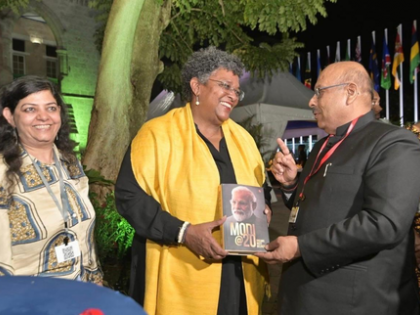Delhi Speaker Vijender Gupta gifts book on PM Modi to Barbados premier
By IANS | Updated: October 11, 2025 20:10 IST2025-10-11T20:05:03+5:302025-10-11T20:10:14+5:30
New Delhi, Oct 11 Delhi Assembly Speaker Vijender Gupta on Saturday gifted a book on Prime Minister Narendra ...

Delhi Speaker Vijender Gupta gifts book on PM Modi to Barbados premier
New Delhi, Oct 11 Delhi Assembly Speaker Vijender Gupta on Saturday gifted a book on Prime Minister Narendra Modi to Barbados Premier Mia Amor Mottley on the sidelines of the 68th Commonwealth Parliamentary Conference (CPC) in Barbados.
Gupta gifted PM Mottley a copy of the book “Modi@20: Dreams Meet Delivery” — a tribute to the transformative leadership and visionary governance of Prime Minister Narendra Modi.
The meeting highlighted shared democratic values and mutual interest in expanding cooperation between India and Barbados.
Gupta highlighted how India’s remarkable progress under PM Modi’s leadership has become a model of inclusive development, global partnership, and resilient governance.
Prime Minister Mottley expressed her deep appreciation and gratitude for the continued friendship between India and Barbados.
She fondly recalled the timely and generous support extended by PM Modi during the Covid-19 pandemic, emphasising that her country “will never forget India’s solidarity in their time of need”.
The meeting underscored the spirit of friendship, cooperation, and shared democratic values that strengthen the bond between India and Barbados within the Commonwealth community.
Earlier, speaking at a workshop during the 68th Commonwealth Parliamentary Conference (CPC) in Bridgetown, Barbados, Gupta, while sharing his views on the theme ‘Strengthening Our Institutions to Support Democracy’, underscored the imperative of reinforcing democratic institutions, promoting inclusive governance, and deepening the moral foundations of constitutionalism across the Commonwealth.
The conference will culminate on October 12.
Gupta highlighted that democracy, in its truest form, must evolve beyond electoral representation into a culture of equality, accountability, and civic participation.
He emphasised that institutional resilience and ethical governance are indispensable to sustaining public faith in democracy.
“The strength of a democracy,” he observed, “is not defined by the frequency of elections but by the fairness of its institutions, the inclusiveness of its representation, and the conscience of those who govern.”
Reflecting on India’s democratic journey, Gupta noted that the country’s pursuit of inclusive representation began with the 73rd and 74th Constitutional Amendments of 1993, which institutionalised Panchayati Raj and municipal governance and reserved one-third of all seats for women in local bodies.
Disclaimer: This post has been auto-published from an agency feed without any modifications to the text and has not been reviewed by an editor
Open in app